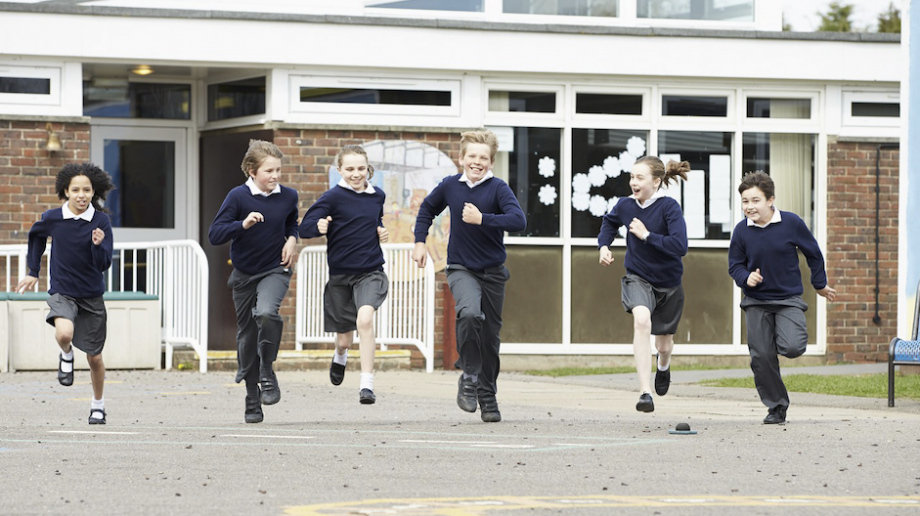
Why play areas are more important than ever
Outdoor play is vital for children’s physical, mental and emotional health, and post-lockdown, outdoor play will be essential in helping children to recover. But as the number of public playgrounds continues to decline, Mark Hardy, chair of the Association of Play Industries, explains why schools’ play facilities are more important than ever
Away from home, playgrounds are the most popular spaces for outdoor play at least once a week, closely followed by green spaces, and they are also the third most adventurous place for children’s play. According to a new national survey from the University of Reading of 1919 adult respondents, children on average spend more time playing in playgrounds than any other place.
Despite this, playgrounds are hugely under-funded and are disappearing fast. If playgrounds continue to decline at the current rate, our communities could look very different very soon and once a playground disappears it is usually gone forever. We are in danger of short-changing children, particularly those from the one in eight UK households without gardens and those in the most disadvantaged areas.
Schools in lockdown
Throughout the lockdowns, the constantly changing guidance for schools has been confusing and challenging, to say the least. However, one critical fact has emerged over the course of the Covid-19 pandemic, that playing outdoors poses a negligible risk to children: indeed, the risks to their mental and physical health of not playing outdoors are far greater.
Schools, now faced with the idea of children having to ‘catch-up’ academically, may feel under pressure to increase classroom time at the expense of allowing children time to play outdoors freely in the school playground.
What the lockdowns taught us
During one of the most difficult periods in recent times, parents have relied upon public playgrounds to keep their children mentally and physically well. As with so many aspects of our society, the lockdowns have forced us to see what really matters – that play is vital to the healthy development of children and playgrounds are essential.
For more than a year, children across the UK have been forced to spend time indoors, inactive and isolated due to Covid-19 restrictions. There has been an unprecedented increase in children’s mental health problems, drastically reduced physical activity and a rise in screen time. Now that schools are open again, the need for play should not get overlooked. Children will be better equipped to learn if they are given the time and space to play freely in schools’ outdoor play areas.
Summer of Play
The Association of Play Industries is joining other organisations and experts in an urgent call for play to be central to children’s recovery from the restrictions placed upon them. We are calling for everyone to help make this summer a #SummerOfPlay for children across the UK, to shift the focus away from ‘catch up’ and to prioritise the basic requirement of children to play outdoors with friends.
All UK children need and deserve a promise on play
The Government is now presented with a rare opportunity to mitigate the damage to children caused by lockdown and to support their health and wellbeing for generations to come, with one simple yet powerful public health measure: the UK urgently needs a national network of sustainable public play spaces to support children’s health.
Scotland’s First Minister has promised a £60m fund to renew every play park in Scotland, so that all children have access to a place to play in their own community. The Association of Play Industries has written to the Prime Minister, the Health Minister and the Minister for Housing, Communities & Local Government, urging the UK Government to match this commitment to children’s outdoor play throughout the entire UK.
We have also written to the new Children’s Commissioner for England in the sincere hope of a fresh approach to tackling the serious issues facing children and young people. We have appealed for a strong emphasis on prevention and highlighted the protective nature of outdoor play in dealing with children’s mental health and childhood obesity.
It is essential that the Government sets out a clear plan for investment in outdoor play, so that all children from all backgrounds across the UK have access to community, doorstep playgrounds. There is a real danger that these spaces could disappear for good with catastrophic effects on children’s mental and physical health unless the Government acts now.
School playgrounds matter
As vital as the campaign is for central funding for community playgrounds, school playgrounds also have a critical role to play in children’s health and wellbeing. Almost one third of parents said they rely on school playgrounds to get their children active and 66 per cent of parents said that outdoor play facilities are important when choosing their child’s school. In addition, school can be the only safe place for some children to play, providing their only outlet for physical activity, socialising and fun.
With one in three children overweight or obese by year 6 and child mental health problems at record levels, high-quality outdoor play equipment in schools is now more important than ever. Play is fundamental to the development of pupils’ physical and mental health.
Free, outdoor play boosts learning, concentration, physical literacy, creativity, resilience, confidence and social skills.
How schools can prioritise outdoor play
When schools improve their playgrounds and outdoor facilities, positive things happen. Physical activity levels increase for a start, important at a time when childhood obesity and physical inactivity are rising and time spent outdoors is falling.
To introduce more physical activity into the school day, school playgrounds and outdoor spaces need to deliver outstanding play and learning opportunities. Well-designed, high-quality outdoor facilities for play, learning, sport, PE and physical activity make a huge impact on school life and children’s educational experiences.
Children have natural energy and enthusiasm so schools can make the most of this by building physical activity into the whole school day. Playgrounds and outside spaces get children moving during lesson time, break and lunch times, before and after school, and for extracurricular activities, as well as during sport and PE lessons. Physical literacy levels will improve and many schools report improvements in behaviour and wellbeing too.
Active kids become active adults
School playgrounds help to give children a lifelong love of play. Choosing the right play environment for your school is a significant decision so it is essential to get it right when choosing a provider.
As the UK’s leading play companies, API members are reliable, trustworthy and financially sound. They operate to the highest standards and are backed by the API’s Professional Code of Conduct. They will provide evidence of previous work and references and design exceptional, high-quality play spaces for children of all ages and abilities.
The API Charter encourages members to design fun and challenging play spaces with elements of built-in risk. This drive for innovation ensures API members are always at the forefront of new thinking in play value, inclusivity, safety, diversity, educational value and landscaping.
To find out more about how API members can help schools, visit their School Zone: www.api-play.org/resources/school-zone-schools-get-active/
Further Information:
Latest News
25/09/2025 - 09:51
Charity Speech and Language UK has published its whitepaper in lieu of the delays to the government’s own Schools White Paper – delays which are damaging children’s education, mental health and future.
25/09/2025 - 09:34
The scheme will see high-achieving young people from disadvantaged areas receive letters from students at Kings College London, encouraging them to consider a university education.
24/09/2025 - 10:22
A coalition of over 60 leading organisations from the UK’s creative and digital industries, alongside education experts, are calling on the government to introduce a new Digital Creativity GCSE.
24/09/2025 - 09:59
The Government’s Youth Hub programme – which are hosted by sports clubs and other community venues, will almost double in number thanks to £25 million new investment.
23/09/2025 - 10:18
The Education Committee has released a new report outlining ways the government can achieve its mission of economic growth by investing in the further education (FE) and skills sector.







